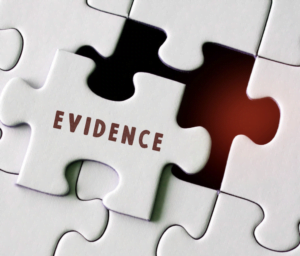Here are 5 examples are of serious problems which need proof if you’re going to deal with them successfully. They all involve the police and the courts. In every case you will need legal advice about what to do. Whether you succeed will depend on what you can prove and how good the evidence is. ONRECORD can help you make good records and improve your chances of success. Here is our advice about making good records - you will need it in every case.
1. Coercive and controlling behaviour
Coercive control is a kind of domestic abuse. Domestic abuse includes not only physical violence but also threats of violence, emotional and verbal abuse, humiliation and constant criticism. All of these can be used to achieve coercive control, which can be just as harmful as a physical attack. Coercive control is a pattern of behaviour adopted by an abuser who over time exerts unreasonable power and control. It’s like psychological warfare aimed at the destruction of a person’s independence. It’s a criminal offence.
The only way you can get help to stop coercive control is to have evidence to prove it’s happening to you. The evidence has to show the pattern of behaviour. To do this you must keep a record of every event as soon as possible after it has happened, together with any supporting evidence, such as photos, witness accounts or any texts or emails. This will be key to getting listened to, getting good advice and taking action. ONRECORD can help you by guiding you through the process of collecting the evidence and saving your records in a chronological report, to share with an adviser and prove your case.
Have a look at some examples of coercive control here.
2. Abuse of Power of Attorney: When an attorney or deputy is not acting in the best interests of a donor.
When the person (known as the ‘donor’) who is wanting someone (known as the ‘attorney’) to act on their behalf if they lose capacity (for example if they are developing dementia),signs a Power of Attorney they’re obviously hoping the attorney will act in their best interests. It is a position of trust and attorneys have a responsibility to act properly and be trustworthy. Sadly sometimes the position is abused and an attorney fails to act in the best interests of the donor.
What is the Court of Protection?
The Court of Protection is a specialist court which deals with all issues relating to people who lack the mental capacity to make specific decisions.
The decisions the Court of Protection make include:
- Who should be appointed as a deputy. A deputy is a person appointed by the Court of Protection to be legally responsible for someone who lacks capacity to make decisions for themselves and who has not signed a Power of Attorney and so there is no attorney in place already;
- What powers an appointed deputy has;
- Deciding upon whether a deputy or attorney has acted properly;
- Whether to remove a deputy or attorney.
If you suspect an attorney is abusing their position or you wish to challenge them on their appointment or on specific actions that they have taken then you will need good clear evidence to support what you’re saying. That evidence will need to be an account of what’s happened and include supporting evidence such as letters, emails, receipts and expense claims to back up what you’re saying. To use legal terminology, you need “corroborating” evidence.
Initially if you suspect malpractice you should contact the Office of the Public Guardian to consider your claim. They can investigate the actions of an attorney and refer concerns to other relevant agencies. In serious cases it can apply to the Court of Protection to take action against the attorney.
See a case example of the kind of records you need to keep.
3. Parental alienation
Parental alienation is the malicious psychological manipulation of a child by one parent against the other  causing the child to be hostile towards the other parent with whom they once had a loving relationship. At the mildest end it can be a parent making critical remarks about the other parent to the child. At the most severe, a parent may make false allegations that the other parent has harmed the child physically or sexually.
causing the child to be hostile towards the other parent with whom they once had a loving relationship. At the mildest end it can be a parent making critical remarks about the other parent to the child. At the most severe, a parent may make false allegations that the other parent has harmed the child physically or sexually.
Don’t confuse parental alienation with cases where contact with the child is being opposed for good reasons. If a parent has good reasons why contact is not safe for a child, then it is not alienation.
Parental alienation can be very hard to prove because:
- It can arise from lots of small and apparently innocuous things said or done over a period of time;
- It is hard to prove what a parent has been saying to their child in private so the only evidence is what the child says or does to the other parent;
- It can be quite easy to find examples of bad behaviour from time to time in anyone but then exaggerate them to make them sound terrible;
- It often seems very hard for lawyers and judges to believe that a parent who can seem charming and respectable in public could act in such a vicious and cruel way.
You will have to work hard to prove parental alienation and the only way will be to gather evidence systematically over time. If you want to find out more about what you need to prove in these kinds of cases here is a link to our blog about warning signs of parental alienation and parental alienation syndrome.
4. Bullying
Bullies can be individuals or a group. Bullying is repeated behaviour intended to hurt the bullied person either physically or emotionally. It can happen at work, in school, online, at home or in the community. If you are experiencing bullying, harassment, cyberbullying or anti-social behaviour then you need evidence to prove it.
Employers should have policies and procedures in place to deal with bullying in the workplace. Find out what they are and how to make a complaint using the grievance procedure.
All schools must take steps to prevent bullying and there should be a bullying policy. Find out what it says. When bullying happens, schools should respond promptly, offer support to the pupil and ensure that the bullying doesn’t get repeated.
To get some good advice about bullying, here are three resources to use:
- Our own guidance on gathering evidence of bullying
- The National Bullying Helpline who are employment law specialists and can help anyone dealing with bullying at work. They also help with bullying at school by providing information and advice to help parents communicate with a school and find a way to stop bullying.
- ACAS
5. Stalking
Stalking can happen to anyone. It is persistent, unwanted attention that makes the victim feel pestered and harassed. It is defined as behaviour that happens two or more times, is directed at or towards you, which causes you to feel alarmed or distressed or to fear that violence might be used against you. It can carry on for a long time and leave the victim feeling continuously anxious and afraid.
Social media and the internet are often used to stalk and harass and ‘cyber-stalking’ or online threats can be just as intimidating as physical stalking.
Collecting good evidence is essential if you’re to have any chance of getting help to stop the stalker.
You’ll find useful information about stalking here.
And advice about gathering evidence about stalking here
For help with cyberstalking go to https://www.thecyberhelpline.com/
They provide free, expert help for UK cybercrime victims.
For legal advice Rachel Horman is an expert in this field.


